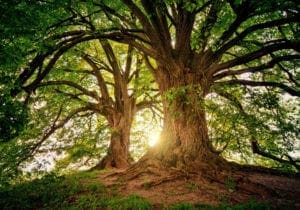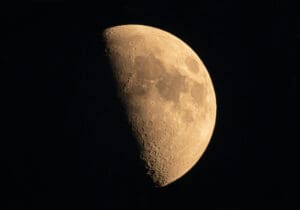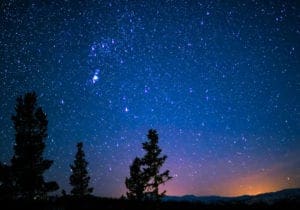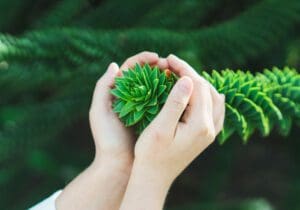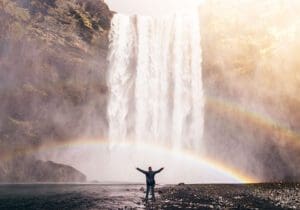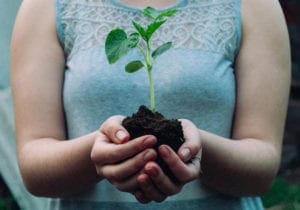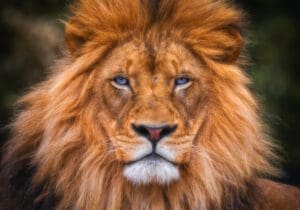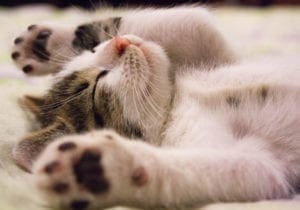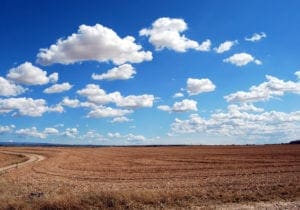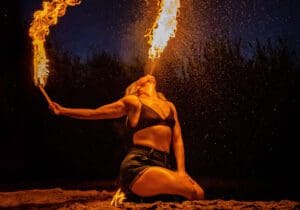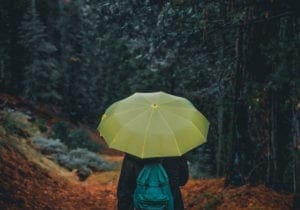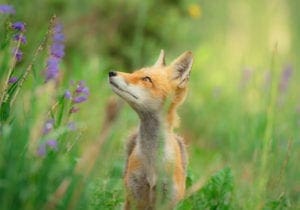
Alcune persone tendono a considerare gli altri esseri viventi come esseri inferiori, o peggio ancora come degli oggetti da usare a piacimento.
Ma gli animali meritano invece tutto il nostro rispetto in quanto hanno sicuramente molto da insegnarci a livello morale e comportamentale.
Qui di seguito una selezione delle più belle frasi sugli animali (in inglese e italiano) che ci faranno riflettere su noi e sul nostro rapporto con la natura. Eccole!
Aforismi, citazioni e frasi sugli animali in inglese (con traduzione)
- An animal’s eyes have the power to speak a great language.
Gli occhi di un animale hanno il potere di parlare uno straordinario linguaggio.
(Martin Buber) - Some people talk to animals. Not many listen though. That’s the problem.
Ci sono persone che parlano con gli animali. Poche persono però li ascoltano. Questo è il problema.
(A.A. Milne) 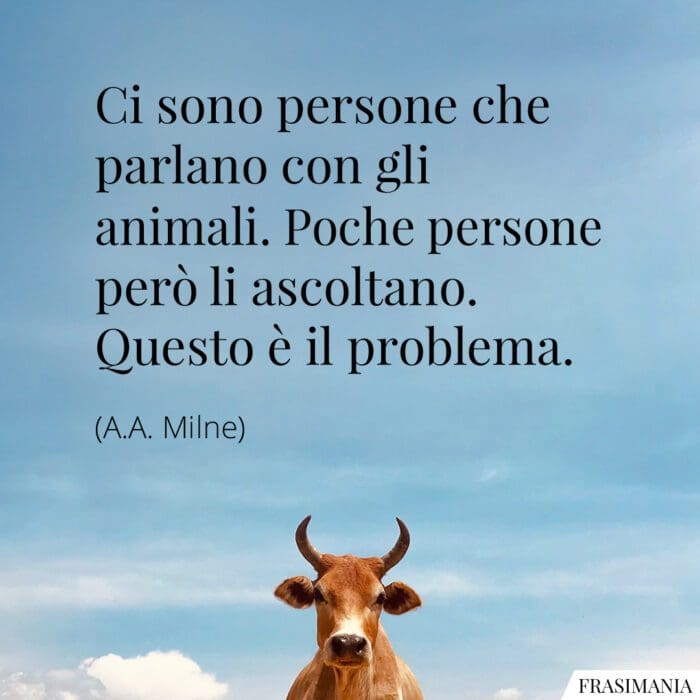
- Shame on such a morality that fails to recognize the eternal essence that exists in every living thing, and shines forth with inscrutable significance from all eyes that see the sun.
Sia dannata ogni morale che non vede l’essenziale legame che esiste tra ogni essere vivente e che risplende solennemente in tutti gli occhi che guardano il sole.
(Arthur Schopenhauer) - The greatness of a nation and its moral progress can be judged by the way its animals are treated.
La grandezza di una nazione e il suo progresso morale si possono giudicare dal modo in cui vengono trattati i suoi animali.
(Mahatma Gandhi) 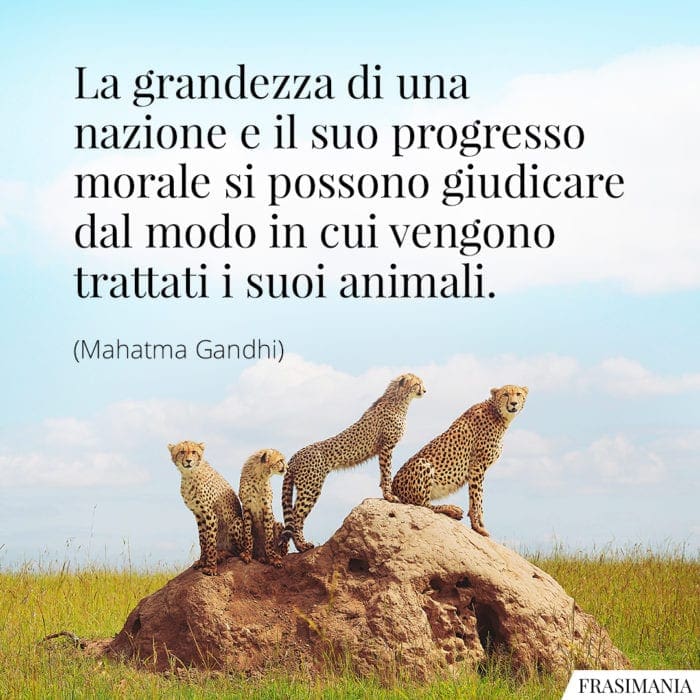
- Man is the cruelest animal.
L’uomo è il più crudele degli animali.
(Friedrich Nietzsche) - People speak sometimes about the “bestial” cruelty of man, but that is terribly unjust and offensive to beasts, no animal could ever be so cruel as a man.
La gente parla a volte della crudeltà “bestiale” dell’uomo, ma ciò è terribilmente ingiusto e offensivo per le bestie: nessun animale potrebbe mai essere così crudele come un uomo.
(Fëdor Dostoevskij) - Happiness is a warm puppy.
La felicità è un cucciolo caldo.
(Charles M. Schulz) 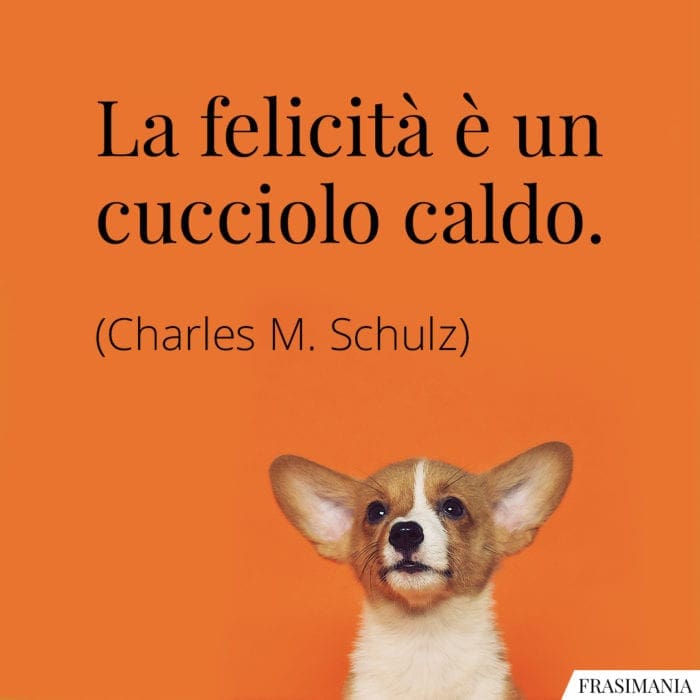
- We can judge the heart of a man by his treatment of animals.
Possiamo giudicare il cuore di un uomo dal modo in cui tratta gli animali.
(Immanuel Kant) - Our task must be to free ourselves by widening our circle of compassion to embrace all living creatures and the whole of nature and its beauty.
Il nostro compito deve essere quello di liberarci allargando la nostra cerchia di compassione per abbracciare tutte le creature viventi, l’intera natura e la sua bellezza.
(Albert Einstein) - Non-violence leads to the highest ethics, which is the goal of all evolution. Until we stop harming all other living beings, we are still savages.
La non violenza conduce all’etica più alta, che è l’obiettivo di tutta l’evoluzione. Fino a che non smetteremo di fare del male agli altri esseri viventi, saremo sempre dei selvaggi.
(Thomas Edison) 
- It is just like man’s vanity and impertinence to call an animal dumb because it is dumb to his dull perceptions.
È tipico della vanità e dell’impertinenza dell’uomo definire stupidi gli animali perché appaiono così ai suoi sensi ottusi.
(Mark Twain) - Animals share with us the privilege of having a soul.
Gli animali condividono con noi il privilegio di avere un’anima.
(Pitagora) - Until one has loved an animal a part of one’s soul remains unawakened.
Fino a quando non avrai amato un animale, una parte della tua anima rimarrà sempre senza luce.
(Anatole France) 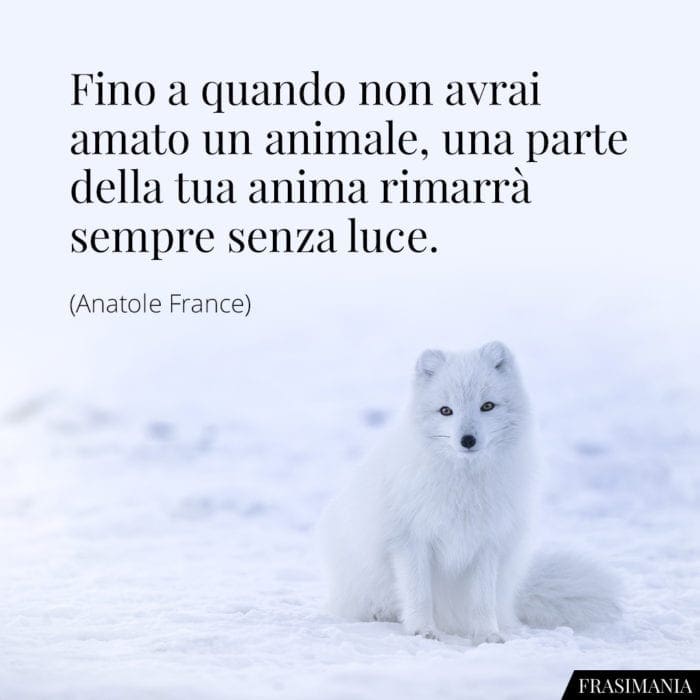
- Animals are such agreeable friends – they ask no questions; they pass no criticisms.
Gli animali sono amici così simpatici: non fanno domande e non riportano pettegolezzi.
(George Eliot) - All animals are distrustful of man, and with reason, but when once assured he does not mean to injure them, their confidence becomes so great that he must be worse than a barbarian who abuses it.
Tutti gli animali diffidano dell’uomo, e non hanno tutti i torti, ma quando sono sicuri che non vuol fargli del male, la loro fiducia diventa così grande che bisogna essere più che barbari per abusarne.
(Jean Jacques Rousseau) - Animals are reliable, many full of love, true in their affections, predictable in their actions, grateful and loyal. Difficult standards for people to live up to.
Gli animali sono affidabili, molti sono pieni di amore, sinceri negli affetti, prevedibili nelle loro azioni, riconoscenti e leali. Tutti standard difficili da trovare nelle persone.
(Alfred Armand Montapert) - The love for all living creatures is the most noble attribute of man.
L’amore disinteressato verso tutte le creature viventi è l’attributo più nobile di un uomo.
(Charles Darwin) 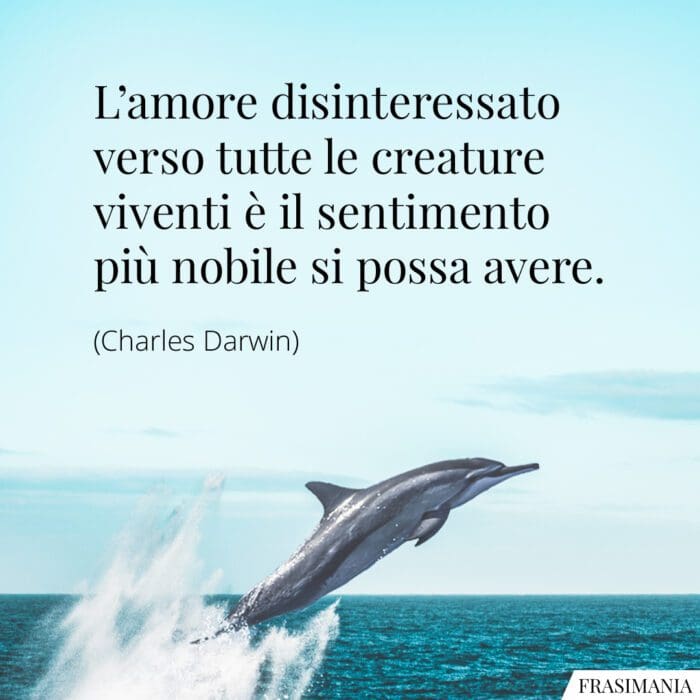
- Man is the only creature that consumes without producing. He does not give milk, he does not lay eggs, he is too weak to pull the plough, he cannot run fast enough to catch rabbits. Yet he is lord of all the animals. He sets them to work, he gives back to them the bare minimum that will prevent them from starving, and the rest he keeps for himself.
L’uomo è l’unica creatura che consuma senza produrre. Egli non dà latte, non fa uova, è troppo debole per tirare l’aratro, non può correre abbastanza velocemente per prendere conigli. E tuttavia è il re di tutti gli animali. Li mette al lavoro, restituendogli il minimo indispensabile per evitargli di morire di fame, e il resto lo tiene per sé.
(George Orwell) - Compassion for animals is intimately associated with goodness of character, and it may be confidently asserted that he who is cruel to animals cannot be a good man.
L’amore per gli animali è intimamente associato con la bontà di carattere, e si può tranquillamente affermare che chi è crudele con gli animali non può essere una brava persona.
(Arthur Schopenhauer) - When a man wants to murder a tiger he calls it sport; when a tiger wants to murder him he calls it ferocity.
Quando un uomo vuole ammazzare una tigre, lo chiama sport; quando è la tigre a volerlo ammazzare, la chiama ferocia.
(George Bernard Shaw) - Two things that have always surprised me: the intelligence of the beast and the bestiality of man.
Due cose mi hanno sempre sorpreso: l’intelligenza degli animali e la bestialità degli uomini.
(Tristan Bernard) 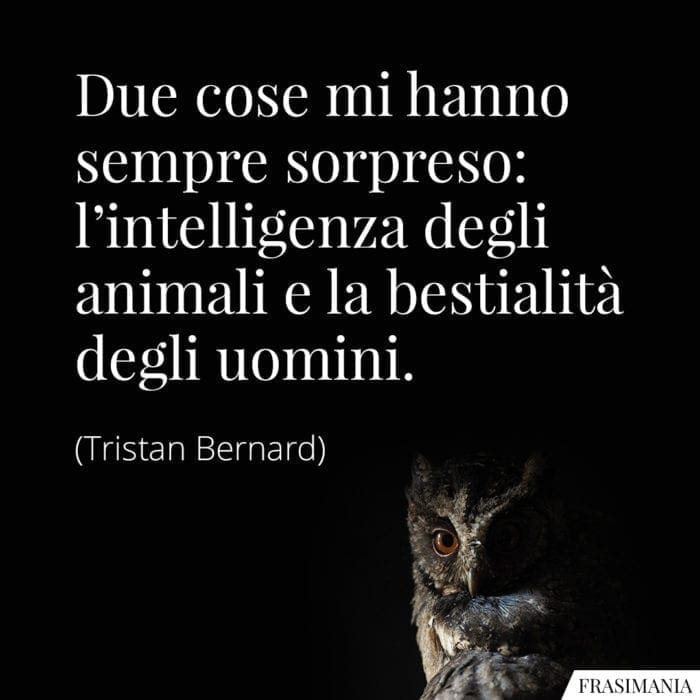
- Besides love and sympathy, animals exhibit other qualities connected with the social instincts which in us would be called moral.
Oltre l’amore e la simpatia, gli animali danno prova di altre qualità legate agli istinti sociali che in noi si chiamerebbero morali.
(Charles Darwin) - Love the animals, love the plants, love everything. If you love everything, you will perceive the divine mystery in things. Once you perceive it, you will begin to comprehend it better every day. And you will come at last to love the whole world with an all-embracing love.
Ama gli animali, ama le piante, ama ogni cosa. Se ami tutto, percepirai il mistero divino nelle cose. Una volta che lo percepirai, inizierai a comprenderlo meglio giorno dopo giorno. E finalmente arriverai ad amare il mondo intero con un amore che tutto abbraccia.
(Fëdor Dostoevskij) - No beast so fierce but knows some touch of pity. But I know none, and therefore am no beast.
Anche la bestia più feroce conosce un minimo di pietà. Ma io non ne conosco, perciò non sono una bestia.
(William Shakespeare) - The time will come when men such as I will look upon the murder of animals as they now look on the murder of men.
Verrà un tempo in cui considereremo l’uccisione di un animale allo stesso modo con cui consideriamo oggi quella di un uomo.
(Leonardo da Vinci) 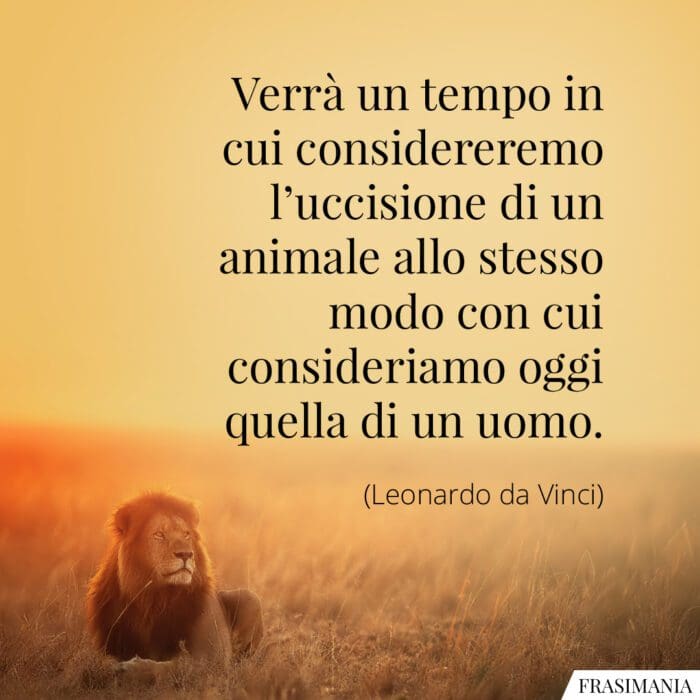
- For as long as men massacre animals, they will kill each other. Indeed, he who sows the seed of murder and pain cannot reap joy and love.
Fintanto che massacreranno gli animali, gli uomini si uccideranno tra di loro. Perché chi semina delitto e dolore non può mietere gioia e amore.
(Pitagora) - Animals don’t hate, and we’re supposed to be better than them.
Gli animali non odiano, e suppongo che noi dovremmo essere migliori di loro.
(Elvis Presley) - Man is the only animal that blushes. Or needs to.
L’uomo è l’unico animale che arrossisce, ma è anche l’unico che ne ha bisogno.
(Mark Twain) - It is only because of a ridiculous excess of vanity that men attribute themselves a soul of different species than that of animals.
È solo per un eccesso di ridicola vanità che gli uomini si attribuiscono un’anima di specie diversa da quella degli animali.
(Voltaire) 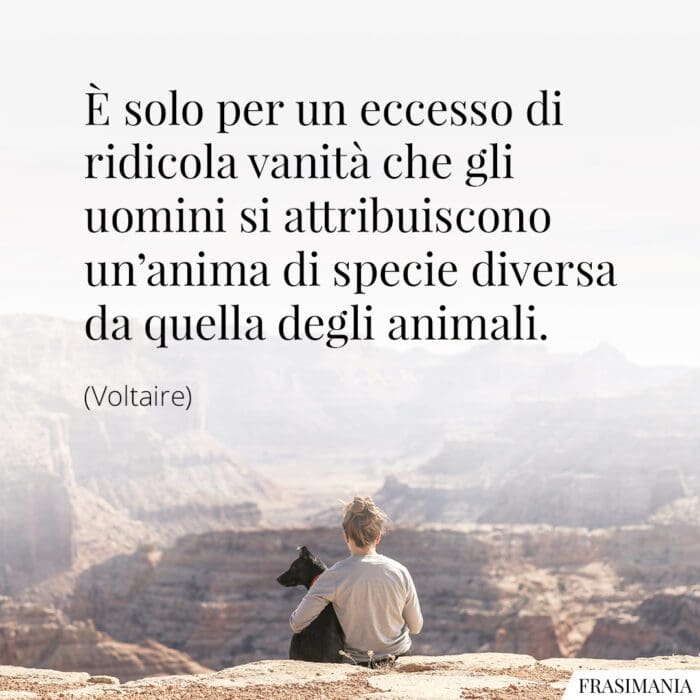
- I am fond of pigs. Dogs look up to us. Cats look down on us. Pigs treat us as equals.
Mi piacciono i maiali. I cani ci guardano dal basso verso l’alto. I gatti ci guardano dall’alto verso il basso. I maiali ci trattano da pari a pari.
(Winston Churchill) - There is no fundamental difference between man and animals in their ability to feel pleasure and pain, happiness, and misery.
Non c’è alcuna differenza fondamentale tra l’uomo e gli animali nella loro capacità di provare piacere e dolore, felicità e miseria.
(Charles Darwin) - Those who wish to pet and baby wild animals “love” them. But those who respect their natures and wish to let them live normal lives, love them more.
Coloro che desiderano accarezzare e coccolare gli animali selvatici li “amano”. Ma quelli che rispettano la loro natura e desiderano lasciarli vivere una vita normale, li amano ancor di più.
(Edwin Way Teale) - Animals are my friends… and I don’t eat my friends.
Gli animali sono i miei amici… e io non mangio i miei amici.
(George Bernard Shaw) 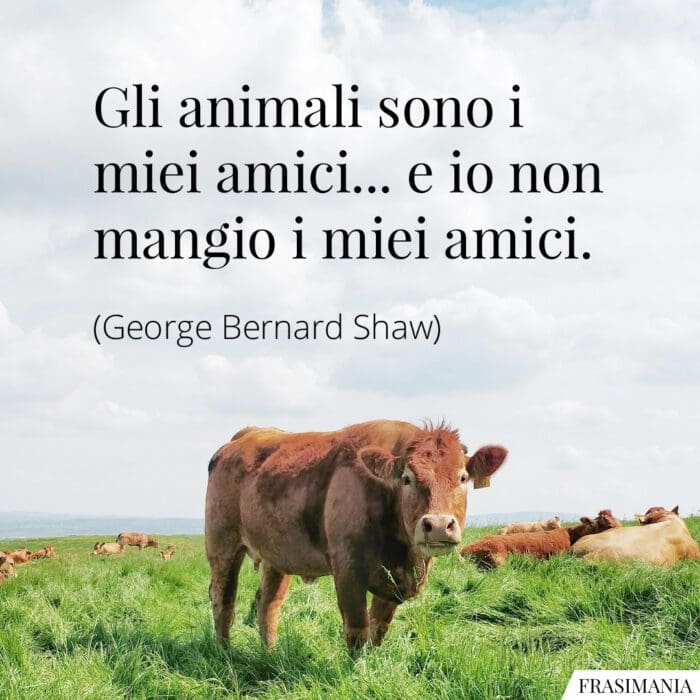
- Killing an animal to make a coat is sin. It wasn’t meant to be, and we have no right to do it. A woman gains status when she refuses to see anything killed to be put on her back. Then she’s truly beautiful.
Uccidere un animale per fare un cappotto è peccato. Non dovrebbe essere il loro destino, e non abbiamo il diritto di farlo. Una donna conquista uno status symbol quando si rifiuta che un animale venga ucciso per essere messo sulla sua schiena. Allora è davvero bella.
(Doris Day) - You can judge a man’s true character by the way he treats his fellow animals.
Puoi giudicare il vero carattere di un uomo dal modo in cui tratta i suoi animali da compagnia.
(Paul McCartney) - I prefer the company of animals more than the company of humans. Certainly, a wild animal is cruel. But to be merciless is the privilege of civilized humans.
Preferisco la compagnia degli animali piuttosto che quella degli umani. Certamente, un animale selvatico è crudele. Ma essere spietati è il privilegio degli umani civili.
(Sigmund Freud) - Deer hunting would be a fine sport, if only the deer had guns.
La caccia al cervo sarebbe un bellissimo sport, se anche i cervi avessero il fucile.
(William Schwenck Gilbert) 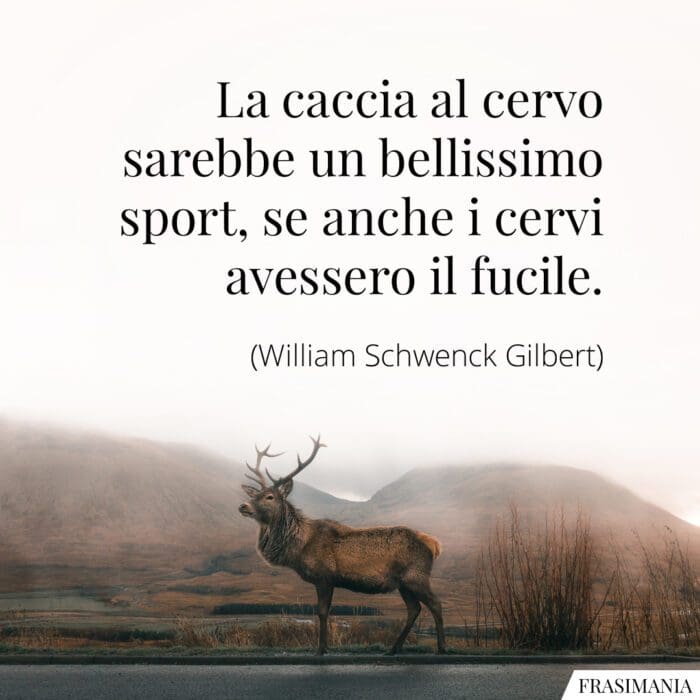
- Men are very strange animals: a mixture of the nervousness of the horse, the stubbornness of a mule and the malice of a camel.
Gli uomini sono animali molto strani: un miscuglio del nervosismo del cavallo, della testardaggine di un mulo e della malizia di un cammello.
(Thomas Henry Huxley) - The animals of the world exist for their own reasons. They were not made for humans any more than blacks were made for whites or women for men.
Gli animali del mondo esistono per ragioni tutte loro. Non furono fatti per gli umani, essattamente come i neri per i bianchi o le donne per gli uomini.
(Alice Walker) - One day we will see our animals again in the eternity of Christ. Paradise is open to all of God’s creatures.
Un giorno rivedremo i nostri animali nell’eternità di Cristo. Il paradiso è aperto a tutte le creature di Dio.
(Papa Francesco) - Until man learns to respect and speak to the animal world, he can never know his true role on Earth.
Fin quando l’uomo non avrà imparato a rispettare e a dialogare con il mondo animale, non potrà mai conoscere il suo vero ruolo su questa Terra.
(Enzo Maiorca) 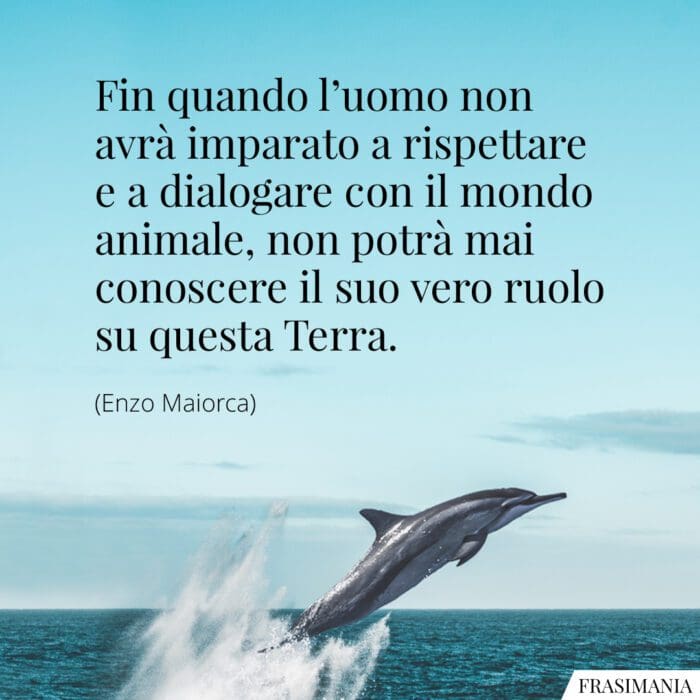
- Experience demands that man is the only animal which devours his own kind, for I can apply no milder term to the general prey of the rich on the poor.
L’esperienza insegna come l’uomo sia l’unico animale che divora la sua stessa specie, poiché non posso usare un termine più gentile per esprimere il saccheggiamento generale dei ricchi sui poveri.
(Thomas Jefferson) - To my mind, the life of a lamb is no less precious than that of a human being.
Per me, la vita di un agnello non è meno preziosa di quella di un essere umano.
(Mahatma Gandhi) - Auschwitz begins wherever someone looks at a slaughterhouse and thinks: they’re only animals.
Auschwitz inizia ogni volta che qualcuno guarda a un mattatoio e pensa: sono soltanto animali.
(Theodor W. Adorno) - Four legs good, two legs bad.
Quattro gambe buono, due gambe cattivo.
(George Orwell) 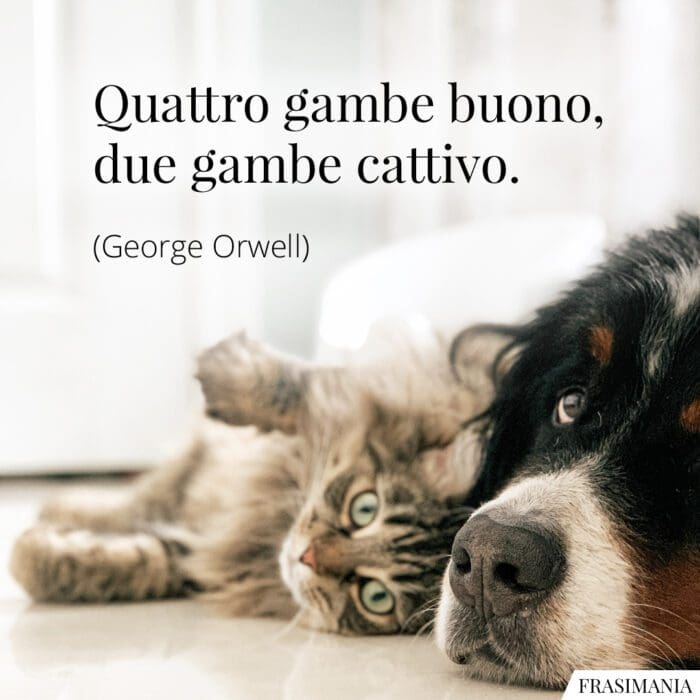
- Of all animals in God’s creation, man is the only one who drinks without being thirsty, eats without being hungry and talks without having something to say.
Di tutti gli animali della creazione, l’uomo è l’unico che beve senza avere sete, mangia senza avere fame e parla senza avere nulla da dire.
(John Steinbeck) - I finally know what distinguishes man from the other beasts: financial worries.
Finalmente so cosa distingue l’uomo dagli altri animali: le preoccupazioni economiche.
(Jules Renard) - Man is an animal that makes bargains: no other animal does this – no dog exchanges bones with another.
L’uomo è l’unico animale portato per gli affari. Nessun altro lo fa: un cane non scambia il proprio osso con un altro cane.
(Adam Smith) - All animals except man know that the principal business of life is to enjoy it.
Tutti gli animali, eccetto l’uomo, sanno che lo scopo principale della vita è godersela.
(Samuel Butler) 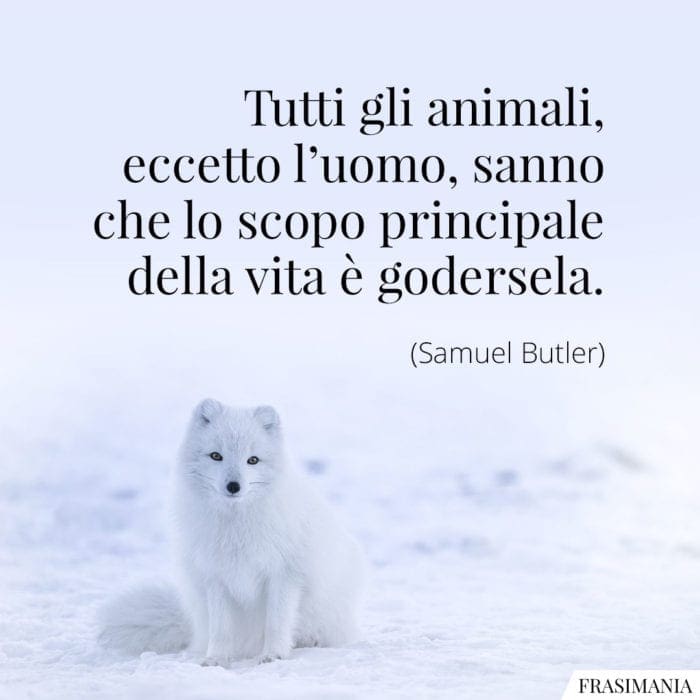
- Concord, solidarity, and mutual help are the most important means of enabling animal species to survive.
Armonia, solidarietà e aiuto reciproco sono gli sturmenti più importanti per consentire alle specie animali di sopravvivere.
(Christian Lous Lange) - Man in his arrogance thinks himself a great work, worthy of the interposition of a deity. More humble, and I believe truer, to consider him created from animals.
L’uomo nella sua arroganza si crede un’opera grandiosa, degna di una creazione divina. Più umilmente, io credo sia più giusto considerarlo un discendente degli animali.
(Charles Darwin) - Our perfect companions never have fewer than four feet.
I nostri compagni perfetti non hanno mai meno di quattro zampe.
(Colette) - The time will come when men such as I will look upon the murder of animals as they now look on the murder of men.
Verrà il giorno in cui uomini come me guarderanno all’uccisione degli animali nello stesso modo in cui oggi si guarda all’uccisione degli uomini.
(Dmitrij Sergeevič Merežkovskij) - Drink water from the spring where horses drink. The horse will never drink bad water. Lay your bed where the cat sleeps. Eat the fruit that has been touched by a worm. Boldly pick the mushroom on which the insects sit. Plant the tree where the mole digs. Build your house where the snake sits to warm itself. Dig your fountain where the birds hide from heat. Go to sleep and wake up at the same time with the birds – you will reap all of the days golden grains. Eat more green – you will have strong legs and a resistant heart, like the beings of the forest. Swim often and you will feel on earth like the fish in the water. Look at the sky as often as possible and your thoughts will become light and clear. Be quiet a lot, speak little – and silence will come in your heart, and your spirit will be calm and full of peace.
Bevi l’acqua della sorgente dove bevono i cavalli. Il cavallo non berrà mai acqua cattiva. Metti il tuo letto dove dorme il gatto. Mangia il frutto che è stato toccato da un verme. Scegli audacemente il fungo su cui siedono gli insetti. Pianta l’albero dove scava la talpa. Costruisci la tua casa dove il serpente si siede per riscaldarsi. Scava la tua fontana dove gli uccelli si nascondono dal caldo. Vai a dormire e svegliati allo stesso tempo con gli uccelli: raccoglierai tutti i grani d’oro dei giorni. Mangia più verde: avrai gambe forti e un cuore resistente, come gli esseri della foresta. Nuota spesso e ti sentirai sulla terra come il pesce nell’acqua. Guarda il cielo il più spesso possibile e i tuoi pensieri diventeranno leggeri e chiari. Taci molto, parla poco: il silenzio verrà nel tuo cuore e il tuo spirito sarà calmo e pieno di pace.
(Serafino di Sarov)


